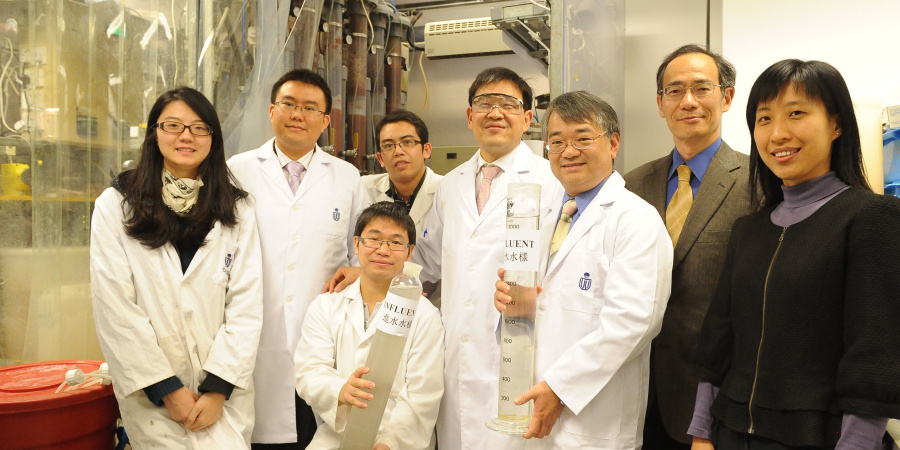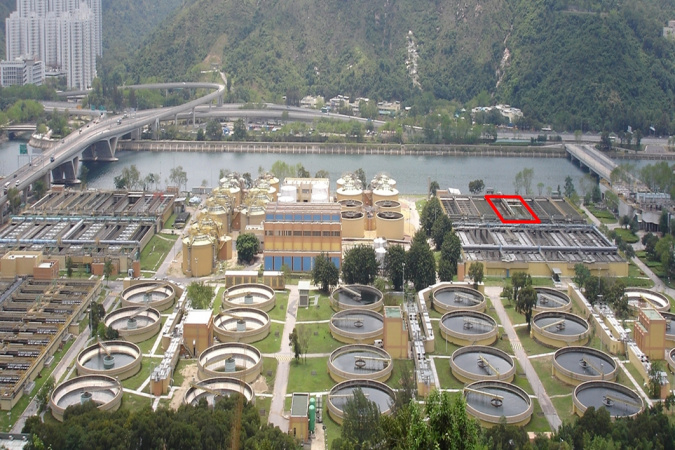HKUST Kicks off Hong Kong’s Novel Sewage Treatment Technology Trial Run Securing the Biggest Sponsorship with Five International Awards
A research team from the Hong Kong University of Science and Technology (HKUST) led by Prof Guanghao Chen of the Department of Civil and Environmental Engineering has leveraged Hong Kong’s unique seawater flushing system to develop a novel, energy-efficient and low carbon sewage treatment technology. A large-scale trial run of the ‘Sulphate reduction, Autotrophic denitrification and Nitrification Integrated (SANI) Process’ will soon be going in full swing under the joint sponsorship of the Drainage Services Department, the Innovation & Technology Fund and others which pitched in HK$24.6 million, the biggest sponsorship for a local single environmental project. This pioneering comprehensive water management and sewage treatment platform has also been enthusiastically honored beyond borders, earning five international awards in 2012 including the Huber Technology Prize of Germany, the Finalist of the World Smart Cities Awards of Spain and three other prestigious awards of the International Water Association (IWA). The HKUST team was also invited by the UNESCO-IHE Institute of Water Education to join a four-year research to develop this environmentally-friendly and economically-viable practice. Its findings have been co-published at an IWA-hosted magazine Water21, especially for third world countries hard hit by water scarcity, such as Cuba.
HKUST President Prof Tony F Chan said, “HKUST is dedicated to inventing cutting-edge green technologies. We are glad that the SANI Process and the hybrid water resource system were all developed in Hong Kong. This achievement was a breakthrough of sewage treatment over the past century. We are hoping that it will be adopted in the coastal cities in Mainland China and other parts of the world. This groundbreaking success of HKUST clearly manifests the government’s staunch support to local innovation and technologies. It also wins HKUST recognition far and wide for its enormous contribution to water management on a global scale.”
Large-scale trial of SANI process kicks off at Shatin Sewage Treatment Works
Prof Guanghao Chen explained, “The research on SANI process started in 2004, followed by a pilot test jointly hosted with the Drainage Services Department at Tung Chung between 2007 and 2010. Results showed that this novel technology effectively eliminated 90% of sewage sludge production, reducing the sewage treatment cost by 50% and space requirement by over 50%, and cutting down greenhouse gas emissions by 35%.”
To help solve Hong Kong’s long-run problem of sewage treatment, the HKUST research team has come up with the SANI Process, supported by the Drainage Services Department, the Innovation & Technology Fund and others. From April 2013 onwards, the technology will undergo a large-scale test that lasts two years at Shatin Sewage Treatment Works at the capacity of 1000 cubic meters of sewage every day.
Mr Wing-cheong Fung, Senior Electrical and Mechanical Engineer in the Drainage Services Department who is responsible for developing and participating in SANI Process’s trial run at Tung Chung said, “The Department has long been putting conscientious efforts into research and development while maintaining close contact with industry. This joint research project with HKUST will help optimize the current sewage treatment processes. We will continue to provide backup for the smooth running of the project. After the passing of tests, we will consider applying the technologies in different sewage treatment works in the territory.”
Triple Water Supply System Curtails Energy Consumption, Water Use and Greenhouse Gas Emissions
The innovative triple water supply system combines freshwater, seawater flushing and cooling, and water recycling systems for air-conditioning, kitchen and laundry. The Hong Kong Airport is the first organization in the world to put the triple water supply system into use, resulting in 52% saving of freshwater demand and up to 20 million in electricity bills and of 30 million kilowatt hour, as well as a reduction of 17,000 tonnes of carbon dioxide emissions per annum, an amount tantamount to greenhouse gas emissions by 5,500 private cars.
Hong Kong is the only city in the world using seawater for flushing on a city scale. Making an extensive use of the system, the Water Supplies Department has delivered savings of 740,000 cubic meters per day of freshwater. The water saved in Hong Kong exceeded those recycling systems in Australia and Japan, making it one of the most efficient and cost-effective water facilities in the world.
Sweeping five awards in 2012
The dedicated research team comprises HKUST faculty including Prof Guanghao Chen, Dr Samuel H K Chui, Dr Hui Lu and Dr Feng Jiang, Prof Mark van Loosdrecht of the Delft University of Technology in the Netherlands and Prof George Ekama of the University of Cape Town in South Africa. The team is also joined by partners including the Drainage Services Department, the Water Supplies Department and the Hong Kong Airport Authority.
This research team has secured the following five prestigious international awards in 2012, with HKUST becoming the first local higher education institution to receive the above honors.
The International Huber Technology Prize of Germany - Second Prize
Huber Technology Foundation hosts the International Huber Technology Prize triannually recognizing outstanding young researchers who develop novel sustainable water management technologies. This year, Dr Hui Lu, a former HKUST PhD student who is currently Associate Professor at the Sun Yat-sen University in Guangzhou, won the Second Prize with his research on the SANI Process.
The World Smart Cities Awards of Spain - Finalist in the Group Category
Assessed by the Smart City Expo World Congress, the World Smart Cities Awards 2012 is created to find the best projects and innovative cities in line with the Smart City concept. The team entered the finals with its novel hybrid water resource system and recycling platform.
Three awards conferred by IWA
- The East Asia Honour Award in Applied Research Category of the Project Innovational Award (PIA) - novel hybrid water resource system and recycling platform
- The Global Grand Honour Award in Applied Research Category of the PIA - novel hybrid water resource system and recycling platform
- The IWA Sustainability Specialist Group prize for innovation in the practical realization of sustainable urban water management - triple water supply system
IWA is the largest international professional association on water management. It plays host to the PIA that runs on a two-year cycle to recognize innovation and excellence in water engineering projects. The projects first compete at the regional rounds in one of the four regional bases, followed by the finals. The IWA Sustainability Specialist Group prize is alternatively assessed by a judging panel formed by the IWA Sustainability Specialist Group.
About SANI Process
Conventional biological wastewater treatment processes make use of microbes to convert pollutants in water into carbon dioxide in order to sanitize wastewater. Since microbes grow rapidly, conventional processes produce large amounts of microbes which become sludge. The SANI Process technology, on the other hand, makes use of a common microbe called Sulphate-reducing bacteria, which makes use of Sulphate in seawater as the medium to oxidize and eliminate pollutants. Since the microbe boasts high efficiency and low growth rate, it minimizes sludge production by 90%, hence its naming as SANI Process, meaning “sludge-killing” in Chinese.
Any opinions, findings, conclusions or recommendations expressed in this materiall / event (or by members of the project team) do not reflect the views of the Government of the Hong Kong Special Administrative Region, the Innovation and Technology Commission or the Panel of Assessors for the Innovation and Technology Support Programme of the Innovation and Technology Fund.


